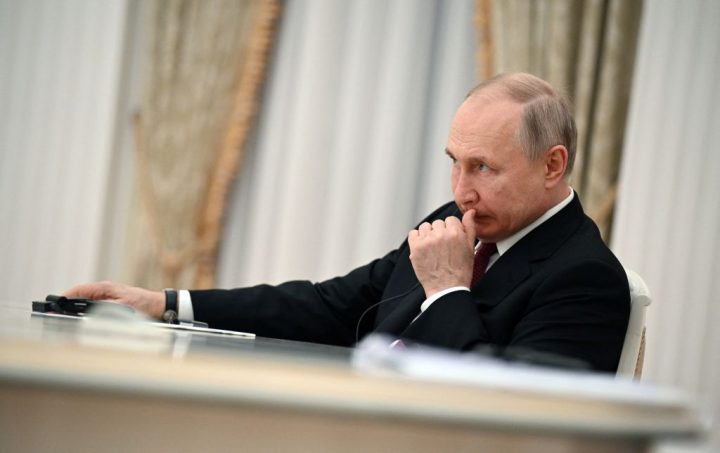Days before Nato leaders descend on Vilnius for the alliance’s annual summit next month, things will be afoot just across the border in Belarus. In a meeting with Belarusian leader Alexander Lukashenko at his summer residence in Sochi on Friday, Putin revealed that Russia will start deploying nuclear weapons to the country on the weekend of 7 and 8 July.
Putin’s decision to move nuclear weapons into Belarus just three days before the Nato summit begins in Lithuania is almost certainly no coincidence. As the alliance he regularly rages about prepares to sit down to discuss defence and deterrence, the Russian president is metaphorically puffing out his chest to remind them that he is worth taking seriously, actually.
‘On the most sensitive issues that we agreed on,’ Putin told Lukashenko, ‘everything is going according to plan. As you know, on 7 and 8 July, the preparation of the relevant facilities will be completed, and we will immediately begin measures related to the deployment of the relevant types of weapons on your territory. So everything is according to plan, everything is stable.’
Putin will be hoping that it serves as a timely reminder for Biden, Sunak and the other global leaders of what they’re up against as they sit down to discuss the war
Those who don’t typically follow Putin’s every move would be forgiven for not having a clue what he’s talking about. Were the topic of conversation not weapons of mass destruction, his cartoonish conspiratorial vagueness about ‘sensitive issues’, ‘relevant facilities’ and ‘measures’ would seem almost comical.
The reason we do know, though, that the ‘relevant types of weapons’ Putin mentions are of the nuclear type is because of an announcement the Russian president made three months ago. In March during an interview on Russian TV, Putin revealed his intention to transfer nuclear weapons to Belarus.
Putin insisted this deployment wouldn’t violate the terms of the international treaty for the non-proliferation of nuclear weapons (NPT). He had taken the decision, he said, in response to the UK’s announcement that it would be providing Ukraine with depleted uranium shells.
In a classic example of Putin’s victimhood complex shining through, he said it was nothing the US had not already been doing with its allies for years: ‘We, in principle, are doing everything that they have been doing for decades.’ In other words, he was saying, they started it. Lukashenko, if we are to believe Putin, ‘had long asked for this’.
Curious, then, that Lukashenko will not actually hold any control over these weapons. As defence minister Sergei Shoigu confirmed last month, ‘Russia is not transferring nuclear weapons to the Republic of Belarus: control over them and the decision on their use remains with the Russian side.’ It is this technicality that means that Putin is correct to say moving nuclear weapons to Belarus does not officially violate the terms of the NPT.
But this technicality is, in reality, of little solace. The reality is that nuclear weapons are to be stationed in Lukashenko’s country, and he will have no control over when, why or how they are used.
Despite Putin’s assurances, and Lukashenko’s, what they insist is a request by the Belarusian leader for these weapons to be moved into the country, will almost certainly have in fact been an order from the Russian president for Belarus to store them. The likelihood that Lukashenko had any involvement in this decision is small; with this, if there had been any doubt before, Lukashenko’s transition into Putin’s puppet is complete.
This announcement from Putin comes days after the start of the Ukrainian counter-offensive. Indeed, even he acknowledged it had begun, although he did his best to claim that the Ukrainian army had had no successes so far.
Moving nuclear weapons into Belarus doesn’t suggest, though, that Putin is any more likely to deploy them in Ukraine or anywhere else. This antagonistic move of his is certainly designed to ratchet up tensions with Nato; so far the muted response from the alliance suggests they’re doing their best not to rise to the bait. But some experts have speculated whether it serves another purpose as a handy negotiation tool when the time for talks with Ukraine and the West eventually comes.
However, whether delayed by coincidence or design, the date the weapons are to be transferred is not insignificant: just three days later, world leaders will be gathering at the Nato summit to discuss defence spending and how Ukraine can be further supported. Ukraine’s own potential membership in the alliance is also likely to feature in the talks.
Moving nuclear weapons to within touching distance of Nato’s borders on the eve of its summit is pointed. Putin will be hoping that it serves as a timely reminder for Biden, Sunak and the other global leaders of what they’re up against as they sit down to discuss the war. However, disappointment is all that awaits him if he thinks his nuclear reshuffle will deter Nato from helping Ukraine.







Comments